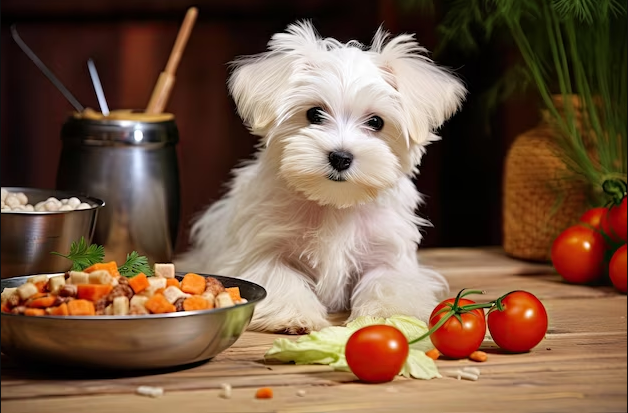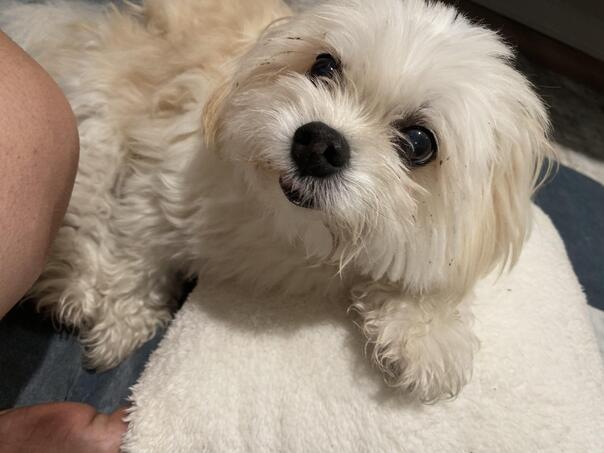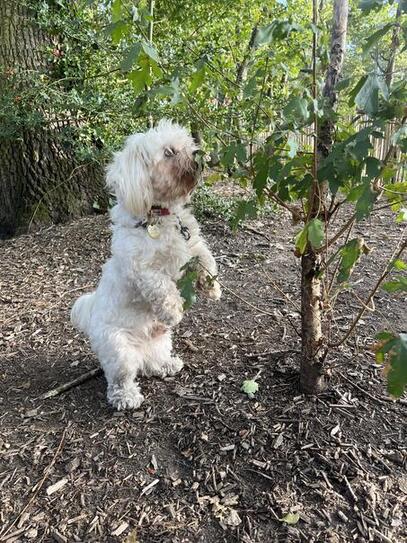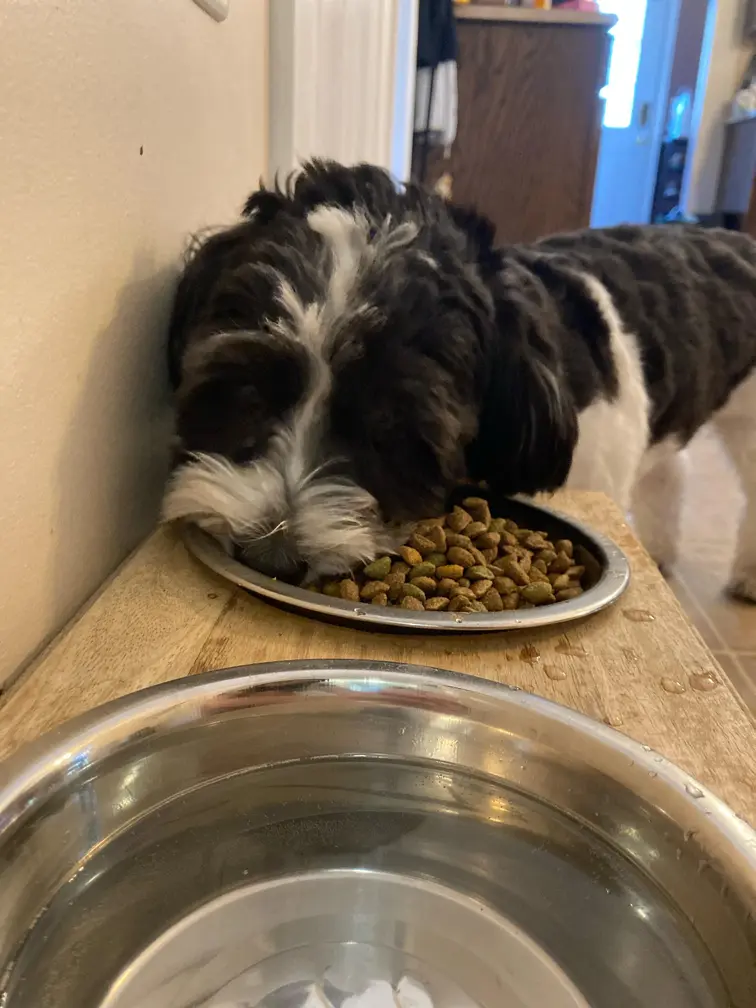Maltese are small dogs and have a playful and loving personality. They are quick learners and pay more attention to reward-based training. Malteses are naturally loving breeds and fit best in any family.
They love to be around their people. When you adopt a Maltese or any other pet, your first responsibility is to make sure what is good to feed your pet. It is not as easy as it seems.
Every pet, especially when it comes to different breeds of dogs, has different nutrient requirements and taste preferences. There might be some ingredients that are not suitable for different breeds of dogs.

Being a pet owner like you, I understand your concerns regarding the diet of your pet. That’s why you are here to know what Maltese can and cannot eat. So let’s get started;
Maltese can eat skinless chicken, turkey breast, lean beef, and fish. Fruits like apples, bananas, and blueberries. Vegetables like sweet potatoes, carrots, peas, broccoli, and green beans. Plain rice, plain yogurt, and sugar-free peanut butter are also safe.
And,
Maltese can’t eat chocolate and caffeine because of theobromine. Fruits like grapes and raisins. Vegetables like onions and garlic. High-fat foods such as butter, raw meat, and fish are also considered toxic for Maltese. Bones are also not recommended and be a choking hazard for them.
If you want to go in-depth, keep on reading!
What Malteses Can Eat?
When it comes to what Maltese can eat, there is a list of items that are good for them. A healthy and quality diet means a healthy and long life. That’s why it is better to follow the right steps to make sure that your dog is not having anything toxic.

Commercial Dog Food
Commercial dog foods are made dog-friendly and contain all the required nutrients. It is a mix of carbohydrates, proteins, fats, vitamins and minerals. Malteses need food with limited ingredients and all the beneficial ingredients for good health. Commercial dog food is an ideal choice, having limited ingredients and all health benefits. It is easily available and comes in different forms like canned wet food or dry kibble. Some of my favorites are:
- Blue Buffalo Life Protection Formula Dry Dog Food
- Wellness Core Natural Grain-Free Dry Dog Food
- Taste of the Wild High Prairie Grain-Free Dry Dog Food
- Orijen Original Dry Dog Food
- Royal Canin Maltese Adult Breed Specific Dry Dog Food
- Hill’s Science Diet Adult Small Paws Chicken Meal & Rice Recipe Dry Dog Food
- Purina Pro Plan Small Breed Formula Adult Dry Dog Food
- Natural Balance Limited Ingredient Diets Small Breed Bites L.I.D. Dry Dog Food
- Canidae Grain-Free PURE Petite Small Breed Real Chicken Recipe Dry Dog Food
- Nutro Wholesome Essentials Small Breed Adult Farm-Raised Chicken, Brown Rice & Sweet Potato Recipe Dry Dog Food
Lean Protein (Cooked)
Lean protein has a low-fat content. Malteses need protein in their diet. Lean protein sources help to provide the protein while balancing the fat content. Foods that contain lean protein are skinless chicken, turkey breast, and lean beef. These protein sources help to support the muscle and the healthy growth of the body. Some best source for lean protein are;
- Chicken breast
- Turkey breast
- Lean beef
- Pork loin
- Lamb
- Venison
- Bison
- Rabbit
- Duck breast
- Quail
- Lean cuts of veal
- Kangaroo meat
Fish
Fish contains omega-3 fatty acids that are beneficial for the skin and coat of your Maltese. Omega-3 fatty acids also help reduce inflammation and support healthy brain development. It also contains a high amount of protein which plays a part in the overall growth of the body. It is a good alternative to meat. Just remove the small bones to make it easier to eat. Adding fish to your Maltese’s diet is a tasty addition but avoid over usage and cook it properly before serving it to your dog. Best choices for Maltese are;
- Salmon
- Trout
- Tuna (in moderation)
- Sardines
- Mackerel
- Haddock
- Cod
- Tilapia
- Anchovies
- Catfish
- Flounder
- Pollock
- Whitefish
- Halibut
- Mahi-mahi
- Perch
- Swordfish
- Herring
Cooked Eggs
Eggs are enriched with proteins, vitamins, and minerals. Giving eggs to your Maltese will enhance their growth and health. You can add cooked eggs to your Maltese diet as scrambled or boiled eggs. Many Maltese love scrambled eggs but boiled eggs are no less. But eating too many eggs can also upset your Maltese’s stomach.
- Scrambled eggs
- Boiled eggs
- Poached eggs
- Fried eggs (without oil or seasoning)
Fruits
Fruits are not only healthy for humans. They serve the same purpose as animals. Fruits like apples, bananas, and blueberries are best for Maltese. Apple has low calories and is a good addition to your Maltese diet. Remove the seeds because they contain cyanide. As you know bananas are a source of potassium, so it is good to give small slices of banana to your Maltese. Then comes blueberries, bite-sized but delicious and healthy. Other are;
- Apple slices (without seeds)
- Banana slices
- Blueberries
- Strawberries (in moderation)
- Watermelon (without seeds)
- Cantaloupe
- Mango
- Pineapple
- Pear slices
- Raspberry
- Blackberry
- Cranberry
- Kiwi
- Papaya
- Apricot
- Peach
- Plum
- Coconut (in moderation)
- Orange segments (without seeds or peel)
Vegetables
You can serve vegetables to your Maltese but prepare them the right way that is easy for him to eat and digest. Vegetables like sweet potatoes, carrots, peas, broccoli, and green beans are good. All these vegetables contain fiber, minerals, vitamins, and antioxidants. Carrots are beneficial in keeping the vision clear and the immune system strong. Other mentioned vegetables also serve the purpose of the well-being of your Maltese. It is advised to cook the sweet potatoes and broccoli before serving them to your Maltese. Other best choices includes;
- Carrots (cooked or raw)
- Green beans
- Peas
- Sweet potatoes (cooked)
- Pumpkin (cooked)
- Spinach (in moderation)
- Broccoli (in moderation)
- Cauliflower (in moderation)
- Zucchini (cooked)
- Celery
- Cucumber
- Bell peppers (green, red, yellow)
- Asparagus
- Brussels sprouts
- Kale
- Swiss chard
- Beet greens
- Turnip greens
- Collard greens
- Romaine lettuce
Plain Rice
Plain rice is enriched in carbohydrates and also keeps the digestion process smooth. If your dog is having any stomach-related problems then you can feed him plain rice after the consultation of your veterinarian. Cook well before serving it to your dog. But don’t season the rice with anything, keep it plain. Seasoning may not feel good to your Maltese. Also, there could be any allergic ingredients in the seasoning or sauces. So it is always better to avoid it. Choices for plain rices are;
- White rice
- Brown rice
- Jasmine rice
- Basmati rice
- Arborio rice
- Wild rice
Plain Yogurt
If you want to add something nutritious, full of calcium and protein then plain yogurt is the best option. Calcium and protein are essential for muscles and bones. Plain yogurt is basic and made of just two ingredients. It is free of sugars and artificial preservatives. Just like plain rice, plain yogurt is also good for the digestive system.
- Plain Greek yogurt
- Plain regular yogurt
- Skyr (Icelandic yogurt)
Peanut Butter
Peanut Butter with xylitol is a tasty snack and is filled with healthy fats and proteins. Although it’s a tasty snack, you should avoid overusing it. Too much peanut butter can cause weight gain which could lead to obesity. Use it in the appropriate amount. You can offer it as a reward by spreading it over the toys. While choosing the peanut butter, make sure that it is sugar-free.
Dog Treats
Dog treats are used as a reward during training or when your dog follows your command. They are made up of healthy ingredients but you should still check the list of ingredients before buying. Any ingredient used in the treats should be non-toxic for your dog. They are available in a lot of variety, you can choose according to your Maltese diet needs. Don’t overdo it as it can be unhealthy when consumed too much. Some recommended dog treats for Maltese are;
- Milk-Bone Original Dog Treats
- Blue Buffalo Wilderness Trail Treats
- Zuke’s Mini Naturals Dog Treats
- Wellness Soft Puppy Bites
- Greenies Original Teenie Dental Dog Treats
- Old Mother Hubbard Classic Crunchy Natural Dog Treats
- Nylabone Healthy Edibles Natural Dog Treats
- Merrick Power Bites Real Chicken Recipe Grain-Free Soft & Chewy Dog Treats
- Wellness Petite Treats Small Breed Soft Mini-Bites with Lamb, Apples & Cinnamon Dog Treats
- Blue Buffalo Blue Bits Tasty Chicken Recipe Soft-Moist Training Dog Treats
What Malteses Can’t Eat

Now you’re aware of the food that a Maltese can eat, now you’ll have an insight into the food items a Maltese can’t have. Not every food item is right for a dog. So it is good to be aware of such items that are toxic or can cause any potential harm to your furry fellow.
Chocolate
Chocolates are heaven for humans. But when it comes to our beloved dogs, they are highly toxic for them. Chocolates have theobromine which is dangerous for the central nervous system of dogs. Dogs, especially Maltese are highly sensitive to theobromine. Ingesting chocolate can cause diarrhea, vomiting, rapid breathing, seizures, and even death in case of severity. Below are things that DO contain chocolate and are toxic for Maltese too;
- Brownies
- Chocolate cake
- Chocolate chip cookies
- Chocolate-covered raisins
- Chocolate ice cream
- Chocolate Milkshake
- Chocolate pudding
- Chocolate spread
- Chocolate syrup
Grapes and Raisins
Grapes and raisins haven’t been considered good for Maltese because of the damage they can cause to them. Grapes have the potential to damage the kidney causing kidney failure. Ingesting grapes and raisins can induce vomiting, abdominal pain, lethargy, loss of appetite, and even diarrhea. The level of toxicity and damage depends on the amount of intake. That’s why it is recommended to keep grapes and raisins away from Maltese.
Onions and Garlic
Onions and garlic contain thiosulfate that can damage the red blood cells of a dog and cause hemolytic anemia. You should avoid giving onions and garlic to your Maltese because ingesting a small amount can cause vomiting, abdominal pain, pale gums, diarrhea, and lethargy. Avoid giving food items that contain onions and garlic.
Xylitol
Xylitol is present in sugar-free products. It is an artificial sweetener and it has very harmful effects on Maltese. As soon as xylitol enters a dog’s body, it can trigger a sudden release of insulin in the dog’s body. Due to this sugar levels can drop and lead to hypoglycemia. The initial symptoms of xylitol ingestion include loss of coordination, vomiting, and seizure. It can also damage the liver. These are things that comes with Xylitol;
- Breath mints (sugar-free)
- Chewing gum (sugar-free)
- Sugar-free candies
- Sugar-free syrups
Alcohol
Alcohol is toxic for humans so how could it work well for dogs? Alcohol can cause disorientation, diarrhea, tremors, respiratory distress, and coma. If it is ingested in large quantities then it can have severe effects. When it comes to Maltese, they are more sensitive to alcohol as compared to other breeds of dogs. Even a small amount is enough to harm them.
Caffeine
Various food items like chocolate and beverages like coffee, tea, and energy drinks contain caffeine. Every food item or beverage that contains caffeine should be kept away from dogs. Caffeine contains theobromine and theophylline that have the potential to damage the central nervous system of dogs. It is better to prevent it before than regret it later. It also has common effects like vomiting, diarrhea, seizure, rapid breathing, and muscle tremors.
Bones
It is commonly portrayed that dogs love bones but it is not as true as it seems. Bones can be a choking hazard for them. Bone can splinter and cause harm to the dog’s mouth, throat, and digestive tract. If somehow, a bone doesn’t splinter and reaches the digestion system then it can cause constipation. Because the digestive system is not able to break it down completely. You can use soft chew toys as an alternative to bone.
High-Fat Foods
High-fat foods can lead to inflammation in the pancreas. It can cause abdominal pain, diarrhea, and vomiting. High-fat foods have high calories that can be a reason for obesity and weight gain. Obesity comes along with a lot of diseases and affects the quality of life. It is difficult to digest high-fat foods and it causes gastrointestinal issues. Foods that are guilty of high-fat are;
- Bacon
- Butter
- Fried chicken
- French fries
- Hamburgers
- Hot dogs
- Potato chips
Raw Meat and Fish
One of the myths is that dogs like to eat raw meat which is incorrect. Most of the dog owners rely on this myth and serve raw meat and fish to their dogs. Raw meat and fish have harmful effects on the dogs. They contain harmful bacteria that can cause gastrointestinal issues. Raw meat also contains bones which can be a reason for splintering hazard. It is difficult to maintain the nutritional balance of raw meat.

Dairy Products
Dairy products don’t cause any harm but there are some specifications to look at when adding dairy products to your dog’s diet. Like humans, some dogs are also lactose intolerant. They don’t have the enzyme to digest the lactose and sugar in dairy products. So this can cause diarrhea. You should use dairy products in such a small amount that they could be easy to digest for your dog.
What Human Food Maltese Can Eat?
There are human foods that your Maltese can consume, but you should do a portion test before adding it to your dog’s diet. Foods like lean meat, vegetables, fruits, cooked eggs, plain rice, plain yogurt, peanut butter, and oatmeal are suggested for Maltese.

What Fruit Maltese Can Eat?
Not every fruit for Maltese is recommended. Some fruits are toxic or unhealthy. Recommended fruits include apples, bananas, strawberries, blueberries, watermelon, and pears. Apples, watermelons, and pears should be given after removing the seeds. Don’t let your Maltese eat the seeds of fruit. Grapes and Raisins are toxic fruits.
What Grains Maltese Can Eat?
Luckily malteses can consume grains in their diet, but the amount of grains should be less. Grains like brown rice, quinoa, barley, oats, and whole wheat are good for Maltese. Also, the amount of grains should be moderate and they shouldn’t be considered the primary source of protein.

What Meat Maltese Can Eat?
Just don’t serve meat in raw form. It could be hazardous for your Maltese. It should be prepared well without any spices or seasoning. Meats like chicken, turkey, pork, lamb organ meat, and lean beef are good sources of lean protein for Maltese.
What Nuts Maltese Can Eat?
Generally, nuts are not considered safe for Maltese, so it is better to avoid them, but small amounts of specific nuts don’t harm. Plain, unsalted, and unsweetened peanuts & almonds are safe in moderate amounts. Cashews and walnuts are toxic and not recommended for dogs.

What Vegetables Maltese Can Eat?
Safe and healthy vegetables for Maltese are carrots, green beans, peas, sweet potatoes, cucumbers, zucchini, and broccoli. All these vegetables serve to lead a healthy life. Before giving vegetables to your Maltese, cook them properly as cooked vegetables are easy to consume. Onions and garlic contain thiosulfate and are toxic.
How Much Fruit Can I Give My Maltese?
Generally, it is recommended that 10% of fruit intake is enough to fulfill the Maltese’s daily caloric intake. Stay moderated while giving fruits. Fruits are healthy and delicious but they should not cover up the major meal of your Maltese. Always cut fruits in slices to make them digestible.
Takeaway:
Maltese are one of the cute dog breeds and are famous because of their loyal and friendly personality. They get attached easily to humans. You have a cute breed like Maltese, so it would be unfair if you don’t pay attention to its healthy and nutritious diet.
We have been a prey of myths regarding dogs’ food, so it is better to do your own research and seek professional help to get the right information.
This article is meant to cover all the required information regarding what Maltese can and can’t eat. Although the above-mentioned information is based on general research, every individual Maltese has different preferences and needs. So it is better to do a portion test before adding any kind of food to your Maltese diet and monitor any adverse reaction.
Discuss with your vet and then set up the diet accordingly. Do share with other Maltese owners to benefit them
